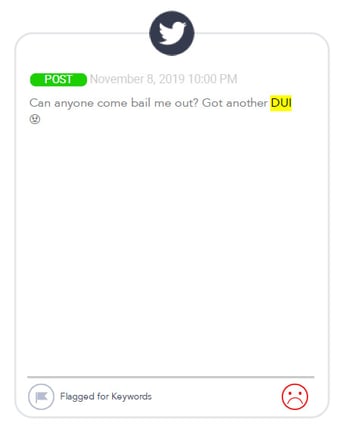How Does Social Media Monitoring in Background Checks Work?

We've all heard sensational news reports about people who've shared something so horrendous online, the content goes viral and the resulting backlash has big consequences, like job termination.
One newsworthy example involves an EMT who made racist comments about a child he treated.
But what happens if people post inappropriate content to their social media channels (or other public blogs or websites), but it's the type of content that doesn't go viral? Perhaps the person brags about driving recklessly and evading police. Or maybe the person talks about illicit drug use. Or consider that employee who threatens violence against a coworker or customer. You get the idea—the content is still highly inappropriate, but for whatever reason, it falls under the radar.
This is exactly the type of content that social media background checks and ongoing social media monitoring look for.
What is a social media background check?
A social media background check is similar to other types of background checks, like criminal checks. It looks at a person's past behavior since a person's past can be indicative of a person's future behavior.
Foley's compliant social media screening service considers content from the following categories:
 Hate Speech
Hate Speech- Insults and Bullying
- Narcotics
- Obscene Language
- Self-Harm
- Threat of Violence
- Toxic Language
- Drug-Related Images
- Explicit/Racy Images
- Violent Images
In addition, our social media solution also has a keyword search option that allows our customers to input personalized words/phrases that they would like to be pulled and included in the report. Plus, our solution also captures online articles that might not necessarily be negative; instead, these articles may provide insight into who the person is and whether they might be a good fit for your workplace culture.
Regarding the compliance piece: When presenting results, we always redact protected class information, which is why you don't want to do it yourself (because you can't "un-see" protected class information).
What is social media monitoring?
Social media monitoring is similar to our other monitoring services (MVR monitoring and criminal monitoring) in that it works on a go-forward basis. The initial social media background check sets the baseline. Then, the ongoing monitoring does exactly that—it monitors people's online activity going forward, looking for content in the categories outlined above.
How does social media monitoring work?
Our social media screening solution combines the best of AI (artificial intelligence) with human oversight. The AI does the heavy lifting by scouring everything that's out there. To do this, it relies on a complex algorithm that crawls pages and indexes them (much like Google does). The tool searches the indexed pages based on specific criteria.
At Foley, we always have quality assurance in the form of a person who monitors the process (for example, making sure the focus is on the correct person—the "right" John Smith) and reviews the results before presenting them to our customers. The QA person reviews the results to make sure everything the customer has asked us to specifically look for is included and falls within the parameters of actionable information per EEOC guidelines—and that the results are presented legally and ethically. The process is amazingly quick, thanks to our unrivaled AI.
Is social media monitoring like Big Brother?
Our social media monitoring doesn't watch an employee's every move, and it doesn't report on an employee's every move. Instead, this solution involves a complex algorithm that knows what words and phrases to "look" for.
For instance, our social media monitoring program wouldn't flag someone posting about "heading out for drinks with friends after work" or "enjoying a fine glass of wine with dinner." But it would flag someone if they brag about driving drunk and barely making it home alive after the party.
Is social media monitoring legal?
Compliant social media screening is legal. But the key word is "compliant." Our compliant social media monitoring solution does the following:
- Provides relevant FCRA-required authorizations/disclosures and gets explicit permission from the candidate/employee to conduct the social media screening and ongoing monitoring for the duration of employment.
- Focuses only on business-related, publicly available information and redacts protected class information when presenting results. As you likely know, it's against the law to discriminate against job applicants or employees based on protected class information, such as religion, race, and sexual orientation (to name just a few). Instead, you need to focus on business-related "actionable" information and respect all applicable privacy laws.
- Does not use any sort of hacking, scraping, or otherwise illegal or unethical ways to gain access to social accounts, such as requesting that applicants/employees provide their social media usernames or passwords for screening purposes.
- Makes a good-faith effort, as dictated by federal and state law, to ensure the correct person is being reviewed (in other words, making sure you're seeing information on the "right" John Smith, for example).
How does social media monitoring work within the overall scheme of background checks?
Consider social media background checks and social media monitoring as two more screens you can add to your overall order. Given how many people use social media and other online outlets daily, we'd argue that some form of social media screening is now a necessity rather than a nice add-on to your employee screening process, especially as younger demographics who are incredibly active social media users, like Gen Z, enter the workforce.
Get peace of mind about the ethics and values of candidates you're looking to turn into employees. Start with a free demo of Foley's social media background checks and monitoring programs.
Related Articles
Is this Legal? Social Media Background Check FAQs
Expanding Horizons: Foley & Good Egg Merge to Strengthen Background Check Offerings
4 Types of Essential Employee Monitoring for Home Healthcare Agencies
.png)



